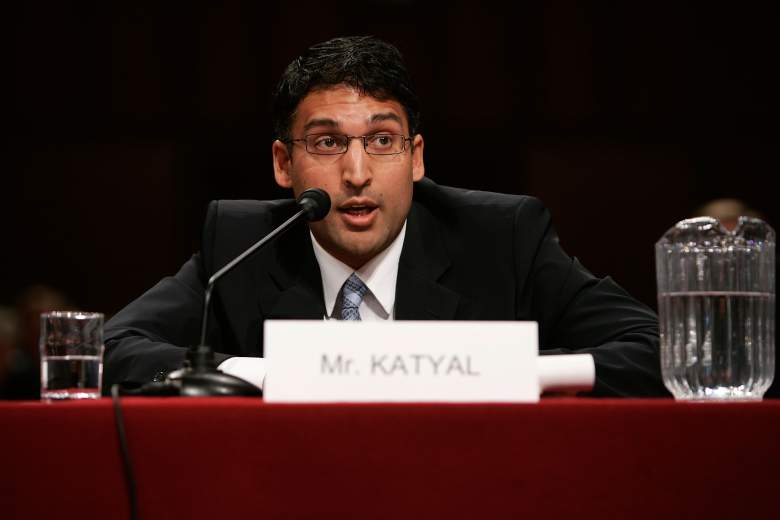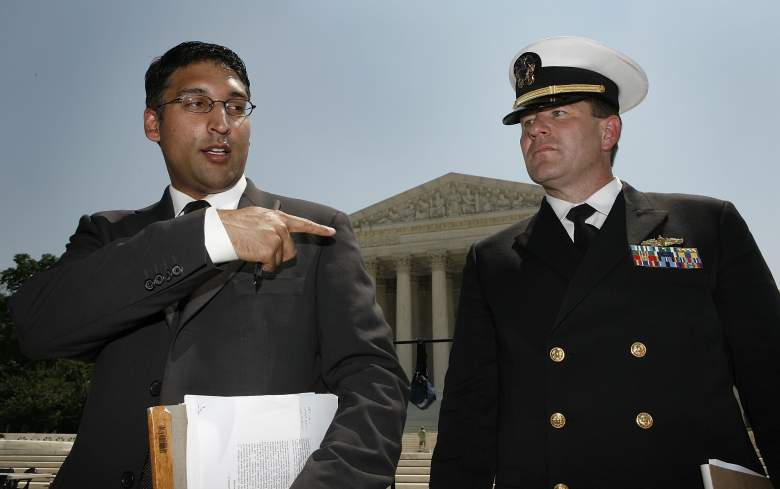
Neal Katyal testifies during a hearing before the Senate Armed Services Committee April 26, 2007 on Capitol Hill in Washington, DC. (Getty)
Neal Katyal, a lawyer and former U.S. solicitor general, will fight President Donald Trump’s new travel ban in court.
On March 7th, the state of Hawaii filed a lawsuit against the president’s new travel ban, asking a federal judge to issue a temporary restraining order against it. Neal Katyal will be serving as an attorney representing the state of Hawaii in the case. In an interview with CNN, Katyal said that the new order “suffers from the same constitutional and statutory defects” as the first one.
Neal Katyal is a Democrat, and he is from Chicago, Illinois. He is married to Joanna Rosen, a doctor, and his brother-in-law is Jeffrey Rosen, the legal affairs editor of The New Republic. Here’s everything you need to know about him.
1. He Successfully Defended the Affordable Care Act in Court
Neal Katyal was serving as the acting solicitor general for the Obama administration when the Affordable Care Act was facing legal challenges. In 2011, Katyal successfully defended Obamacare in front of the Sixth Circuit Court of Appeals.
In an interview with NPR, Katyal argued in favor of the constitutionality of Obamacare’s individual mandate, which requires all Americans purchase health insurance or pay a fine.
“…[E]ven if I might say to myself, I don’t need health insurance. I won’t get sick. The fact is, as human beings with mortality, we are going to get sick and it’s unpredictable when,” Katyal said. “…You’re going to use it. And the only question is, are you going to have the financing now to pay for it. And so the government is regulating financing. It’s kind of like a government law that says you’ve got to pay cash or credit. It’s not the government coming in and saying, oh, consume this product you wouldn’t otherwise consume.”
In the Sixth Circuit Court of Appeals, Jeffrey Sutton, a judge appointed by George W. Bush, ruled that the Affordable Care Act is constitutional.
Katyal was no longer serving as the solicitor general by the time the constitutionality of the Affordable Care Act was argued in front of the Supreme Court in 2012. But in the case of National Federation of Independent Business v. Sebelius, the Supreme Court upheld Obamacare’s individual mandate.
2. He Successfully Defended the Voting Rights Act in a Supreme Court Case
One case that Neal Katyal argued before the Supreme Court was Northwest Austin Municipal Utility District No. 1 v. Holder, which concerned the constitutionality of Section 5 of the Voting Rights Act of 1965.
Section 5 of the Voting Rights Act prohibits certain jurisdictions with a history of discrimination from implementing any voting changes without first getting approval from the attorney general of the United States and the District Court for Washington, D.C. In this Supreme Court Case, Northwest Austin Municipal Utility District Number One sought an exemption from Section 5 and ultimately argued that this part of the Voting Rights Act was unconstitutional. The case also concerned whether Northwest Austin Municipal Utility District Number One actually qualified as a “political subdivision” as defined in the law.
In a unanimous decision, the court ruled that Northwest Austin Municipal Utility District Number One did not meet the definition of a “political subdivision,” but it declined the rule on the constitutionality of Section 5 of the Voting Rights Act.
At the time, a lot of political pundits expected Katyal to lose the case due to the very tough questioning that he was receiving throughout oral arguments.
“I felt they had given me a very thorough inquisition on our position,” he later told The Washington Post. “I know it sounds a little hokey, but I’ve always felt very privileged to be in a room where they’re actually asking hard questions, it’s very refreshing to see that.”
3. He Argued Before the Supreme Court on Behalf of Guantanamo Bay Detainees

Neal Katyal and U.S. Naval Commander Charles Swift, who represent Guantanamo Bay detainee Salim Ahmed Hamdan, a speak after the Supreme Court ruled against the proposed military tribunals June 29, 2006 in Washington, DC. (Getty)
In the 2006 case of Hamdan v. Rumsfeld, Katyal argued that President George W. Bush’s Guantanamo Bay detention center violated the Geneva Conventions.
Katyal represented the plaintiff, Salim Ahmed Hamdan, a Yemen citizen who worked as a bodyguard for Osama bin Laden and who was sent to Guantanamo Bay. He was charged with conspiracy to commit terrorism and was to be tried before a military commission.
A district court judge first ruled that the U.S. could not try Hamdan in a military commission without first showing that he was not a prisoner of war. This decision was subsequently reversed by an Appeals Court, which argued that military commissions are a legitimate and Constitutional way to try enemy combatants and that they do not violate the Geneva Conventions.
Katyal argued on behalf of Hamdan in front of the Supreme Court. Ultimately, the court ruled that these military commissions were not constitutional and that they violated the Geneva Conventions.
According to Vanity Fair, for years before this Supreme Court case, Katyal was obsessed with and outraged by Bush’s military commissions.
“The president could essentially try people at Guantánamo Bay, and he could write all the rules for the trial,” Katyal said. “He would be able to pick the prosecutors, pick the defendants, pick the judges, and handpick the appeals panel.”
4. He Criticized the Justice Department for Its Handling of Japanese Internment Cases
While he was serving as acting solicitor general of the United States, Katyal publicly criticized one of his predecessors and the Justice Department as a whole for its mishandling of several court cases concerning Japanese internment.
In a post on the office Justice Department website, Katyal said that the solicitor general during the 1940s, Charles Fahy, had received a key intelligence report that undermined the rationale behind the interment; a report found that only a very small percentage of Japanese Americans actually posed any threat to national security, and that most of those who posed a threat had already been detained. But the solicitor general did not inform the court of this report and continued to argue in favor of Japanese internment, saying it was impossible to separate out dangerous Japanese Americans from peaceful ones.
“[T]hose decisions still stand today as a reminder of the mistakes of that era,” Katyal said. “Today, our Office takes this history as an important reminder that the ‘special credence’ the Solicitor General enjoys before the Supreme Court requires great responsibility and a duty of absolute candor in our representations to the Court. Only then can we fulfill our responsibility to defend the United States and its Constitution, and to protect the rights of all Americans.”
Katyal also said that this “harmed the court, and it harmed 120,000 Japanese Americans. It harmed our reputation as lawyers and as human beings, and it harmed our commitment to those words on the court’s building: Equal Justice Under Law,” according to the Los Angeles Times.
5. He Says That the Travel Ban is Motivated by Religious Discrimination
In an interview with NPR last month, Neal Katyal said that President Donald Trump’s executive order is illegal, unconstitutional, and was motivated by religious discrimination.
“When you have a ban like this which is motivated by and has the effect of religious discrimination, it really does undermine the kind of associational rights, the kind of freedom of their residents to associate with people of different faiths,” he said.
Katyal also said that the court must take intent into the equation here, peering “behind the veneer of the surface and ask what’s really going on.”
“When it comes to religious discrimination, you can take intent into consideration,” he said. “And here we have prima facia evidence of that because President Trump contemporaneously with issuing the executive order told the Christian Broadcast Network that his intent was to prefer Christians in the immigration context once they allowed people from these seven countries to come back in. Maybe there’s some sort of policy rationale behind that that he hasn’t articulated, but whatever it is, it flatly violates the Constitution.”
In a March 8th interview with NPR, Katyal said that the new travel ban is still unconstitutional.
“I’m very proud to stand with the attorney general of Hawaii, Douglas Chin, who’s been a leader in this and understanding this order for what it truly is, which is discrimination on the basis of religion,” he said. “And yes, now the new order expressly says, ‘oh, we aren’t motivated by racial animus.’ But our Supreme Court has been very clear that the government can’t just simply say something and make it so, and this order from start to finish, from the campaign to every iteration…is all about discrimination against Muslims.”
